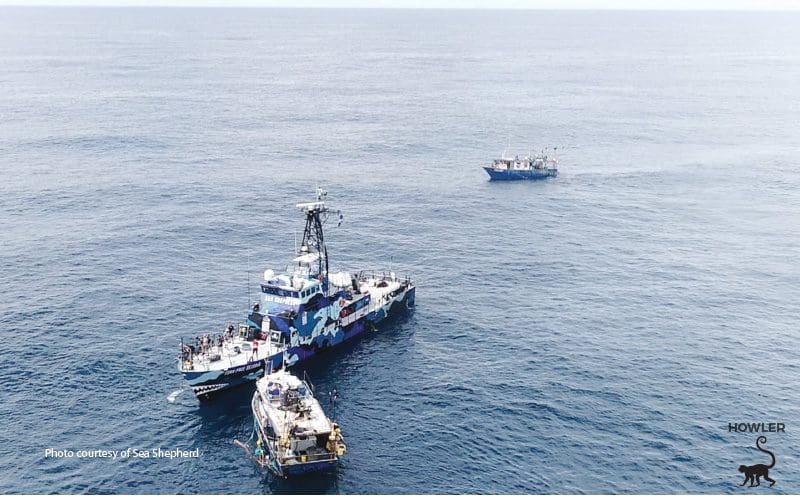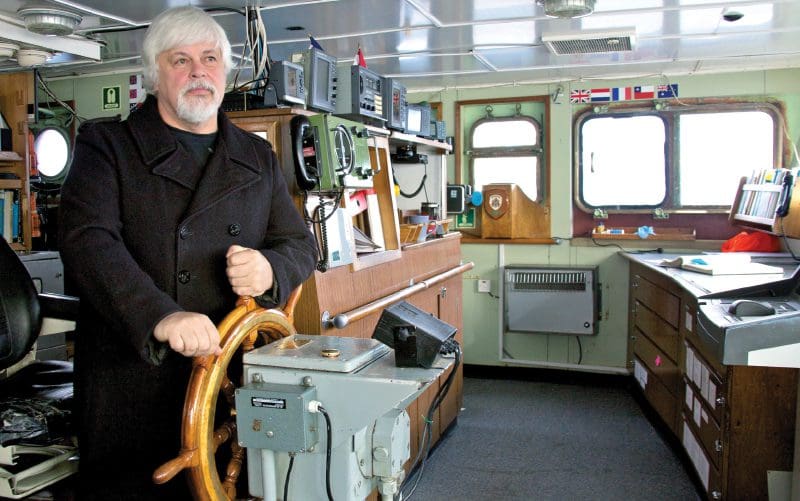
Captain Paul Watson: Rising Above the Undertow
Rising Above the Undertow: Captain Paul Watson’s Renewed Relationship With Costa Rica. Captain Paul Watson regards his past troubles in Costa Rica to be all water under the bridge now. With forgiveness absent of resentment or contempt, the Sea Shepherd Conservation Society founder is excited to rebuild his relationship with the Costa Rican government.
“It’s been a long ordeal, but I really have a lot of faith in this new government,” Captain Watson said in a recent Howler interview. “Whatever comes at us, let’s make it work for us.”
As always, his hope is to enhance Sea Shepherd’s efforts in protecting and preserving the country’s marine life. Last March, the criminal appeals court officially dropped all charges against Captain Paul Watson, turning the tide on two decades of legal disputes resulting in his arrest and subsequent escape while maintaining his innocence.
‘You can stop an individual,
you can shut down an organization,
but you can’t stop a movement.’
An ocean of obstacles
Captain Watson’s personal philosophy was put to the test as he endured almost 20 years of legal hurdles that jeopardized not only his own freedom, but the effectiveness of Sea Shepherd’s actions in Costa Rica.
In 2001, Captain Paul Watson led his crew towards the shores of Cocos Island National Park where they encountered an Ecuadorian ship brutally slaughtering sharks. Watson and crew aided in the arrest of what would be the first illegal fishing vessel confiscated by the Costa Rican court. Sea Shepherd’s new partnership with the Costa Rican Ministry of the Environment was suddenly severed a year later when Watson, authorized by the Guatemalan government, apprehended a Costa Rican poaching vessel that was engaging in illegal activities within Guatemalan waters.
Fabricated charges filed against Captain Watson were dismissed by Costa Rican courts in 2002. But 10 years later he was arrested in Germany on unrelated charges under a Japanese extradition warrant. Coupled with a new modified extradition request from Costa Rica for the 2002 incident, Watson fled Germany and headed for the sea, eventually seeking asylum in France. He was placed on Interpol’s Red List and is still sought by Japanese officials today.
The Red Notices Watson received were a blessing in disguise, personally and professionally. Out of his asylum came a marriage and child, while the global news coverage of his Red Notice took Sea Shepherd to new heights of recognition. The society now works with 50 countries around the world and is stronger than ever.
“You can stop an individual, you can shut down an organization, but you can’t stop a movement,” Watson said. “That’s what we are now.”
This renewed relationship between Costa Rican officials and Sea Shepherd, advocated by the Ministry of the Environment, does more than exonerate one man for his alleged crimes. It bolsters support for the preservation and protection of marine life across the globe.
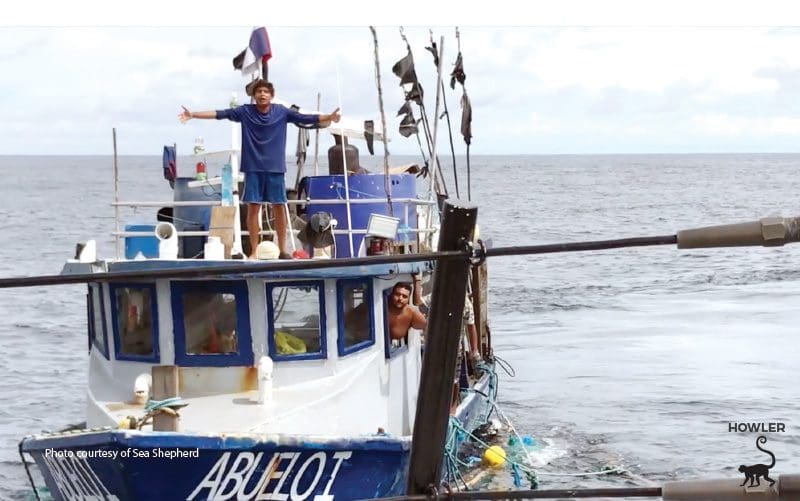
Dangers above, damages beneath
“The ocean is under continuous assault,” Captain Watson stated, referring not only to marine life along Costa Rica’s shores but to our planet’s biodiversity being in a constant state of emergency.
“There are 10 million fishing boats out on the high seas — 4 million of them are illegal.”
These illegal acts, ranging from poaching to polluting, are having a destructive impact on marine ecosystems. Overfishing has consequences for every living organism, both below and above the water’s surface.
Captain Lockhart MacLean, one of Sea Shepherd’s longest-serving crew members, concurs.
“We are post-sustainability in 2019,“ he told the Howler. “We need to look at regeneration as the next stage of preserving ocean life.”
Within the ocean, explained Captain MacLean, corridors linked to one another enable biodiversity to flourish and spread to all parts of the globe. Each corridor depends on those surrounding it. Without linkage, these vital spaces cannot sustain biodiversity.
“They will fail unless the marine corridors that connect them are all patrolled and protected,” Captain MacLean concluded.
“If the oceans die, we all die,” Captain Watson put it plainly. “Most people aren’t aware that phytoplankton needs protection. It’s the foundation for life on the planet. If it disappears tomorrow, we lose 70 percent of our oxygen supply.”
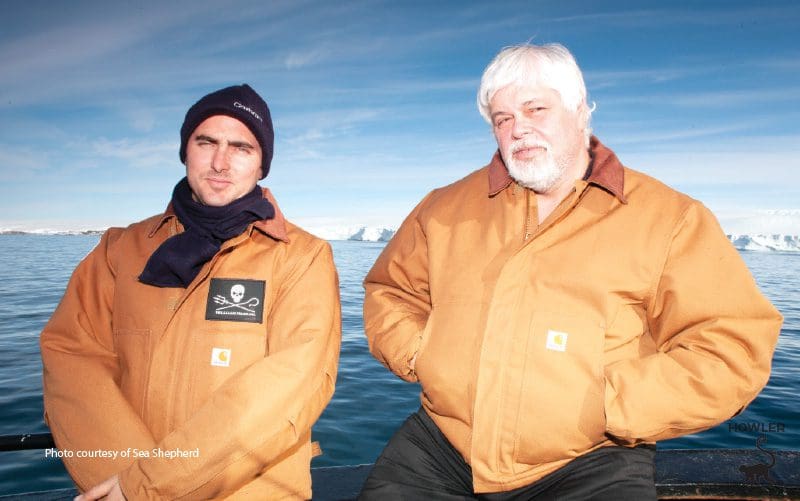
Captain Lockhart MacLean and Captain Paul Watson
Costa Rica’s role in saving our ocean
Recently, Sea Shepherd joined park rangers and Costa Rica’s Ministry of the Environment to remove over 30 tons of illegal fishing gear, trash, and marine debris from the Cocos Island World Heritage Site. (Learn more in the Howler Cover Story) This endeavor is the latest stage in Operation Treasured Isle, a campaign targeting 2,400 nautical miles between Baja California and Peru. The islands and corridors stretched across the Eastern Tropical Pacific include Cocos Island, one of the five most biodiverse regions in the world.
“What you see now diving in Cocos is amazing,” Captain Watson said, “but compared to what it was like in the ‘80s and ‘90s, it has diminished. I don’t want to see that as a continuous pattern, and that’s a real possibility.”
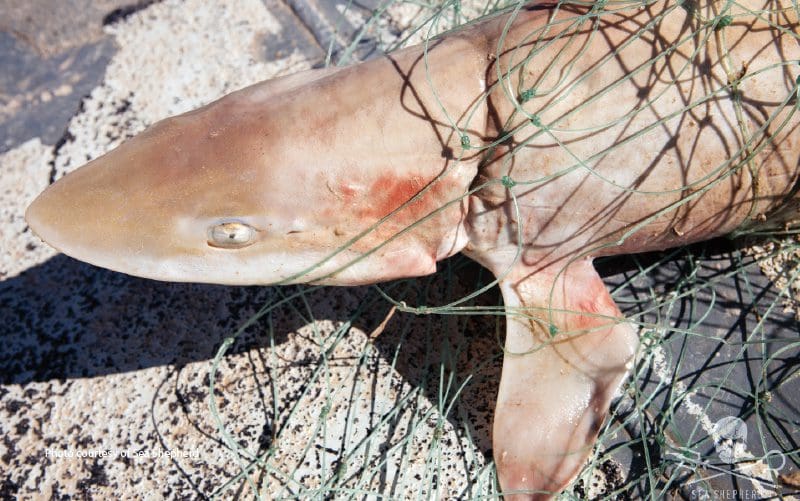
By shielding this area from poaching vessels and strengthening shore-based efforts to ban the sale of illegally caught marine life, the biodiversity within Cocos Island and the rest of the corridor stands a chance of surviving.
“To me, Cocos Island is the absolute perfect example of what an exotic tropical island should be,” Captain Watson said. “I can’t think of any place in the world more beautiful than that island, and most importantly, all the life that’s beneath the waves.”
Captain Paul Watson admires the progress made by the island’s park rangers over the years, with limited resources. “Cocos Island is the crown jewel of Costa Rica and they’re the ones that are protecting it.”
“It’s heartwarming that we can be back here,” Captain MacLean echoes. “One of the world’s most pristine islands should not be covered in long lines.”

